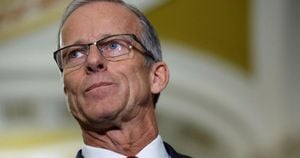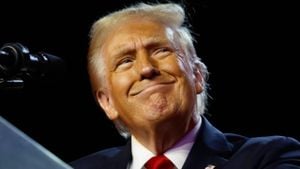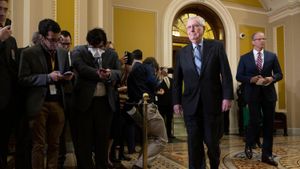Donald Trump's return to the political spotlight has stirred discussions about his economic policies, particularly his proposed tariffs and the potential ripple effects on U.S. consumers and businesses. These tariffs come on the heels of his campaign promises to reshape the economy, raising concerns among economists about possible inflation and economic instability.
During his 2024 campaign, Trump indicated he plans to impose substantial tariffs, including those ranging from 10% to 20% on imports from various nations and even higher rates—up to 200%—on goods from China and Mexico. Such sweeping changes are reminiscent of the trade wars initiated during his first term, which had significant repercussions for American consumers.
A study by the National Retail Federation (NRF) foresees disastrous consequences for everyday products should these tariffs be enacted. Everyday items could see drastic price increases; for example, jeans currently priced at $80 could jump to $96, and appliances could experience similar hikes. With costs rising on essentials like clothing, food, and household gadgets, prices could strain American households, forcing consumers to navigate tighter budgets.
Autozone's CEO Philip Daniele has cautioned investors about passing increased costs from tariffs directly to consumers, echoing comments from executives at Home Depot about exploring alternate sourcing solutions to mitigate these potential price hikes. Meanwhile, the NRF estimates the economic impact could be staggering: consumers might face cumulative losses of around $78 billion due to decreased purchasing power, creating additional pressure on middle-income families.
Another layer of this complicated economic scenario revolves around Trump's tax cuts and their impact on government debt. Trump's proposals to extend the 2017 Tax Cuts and Jobs Act, slash corporate taxes, and eliminate taxes on specific benefits could fatten the federal deficit, potentially fueling inflation. According to estimates, Trump’s tax agenda could inflate the national debt by approximately $7.75 trillion, leading to fears of greater financial instability.
These predictions about rising prices are mirrored by concerns about the housing market, which is already showing signs of strain. Mortgage rates are expected to rise as investors react to Trump's economic plans, with the average 30-year mortgage currently peeking above 6.79%. Economists anticipate higher mortgage costs will deter potential homeowners, just as the market is still recovering from years of stagnation.
California, with its economy heavily reliant on imports, particularly from China and Mexico, could be among the hardest hit. The state imports about 40% of its goods from these countries, which Trump has singled out for increased tariffs. Economic analysts warn California's high cost of living could soar, impacting the prices of cars, electronics, and even groceries. The agricultural sector, which saw retaliatory tariffs during Trump’s previous term, could face similar challenges, especially with the looming threat of mass deportations affecting labor supply.
First-time homebuyers are feeling the burden, finding themselves priced out due to steeply rising mortgage rates and housing costs. The percentage of first-time buyers hit historic lows, with many missing out on the potential wealth accumulation associated with home equity. The situation appears grim; as the market remains volatile, potential sellers are reluctant to list their homes due to prevailing higher mortgage rates.
Despite the dire forecasts and economic tumult predicted under Trump's proposed policies, some manufacturers sense potential benefits. For example, the rise of electric vehicle demand could bolster local industries like battery manufacturing. Still, many express concern over the unpredictability of tariffs and regulations, which may stifle innovation and job growth.
The broader economic atmosphere remains uncertain, heavily influenced not only by domestic policy changes but also by international trade dynamics and market sentiment. With inflation already easing from its peak, there are expressed hopes among some economists for regulatory policies to stabilize the economy. Yet this requires balanced decision-making and insightful economic strategies to avoid repeating past mistakes.
Experts agree: While Trump’s policies might attract attention, they could lead to unintended consequences for American families, businesses, and the overall economic climate. The looming question remains, can voters expect improvements or face setbacks instead?



